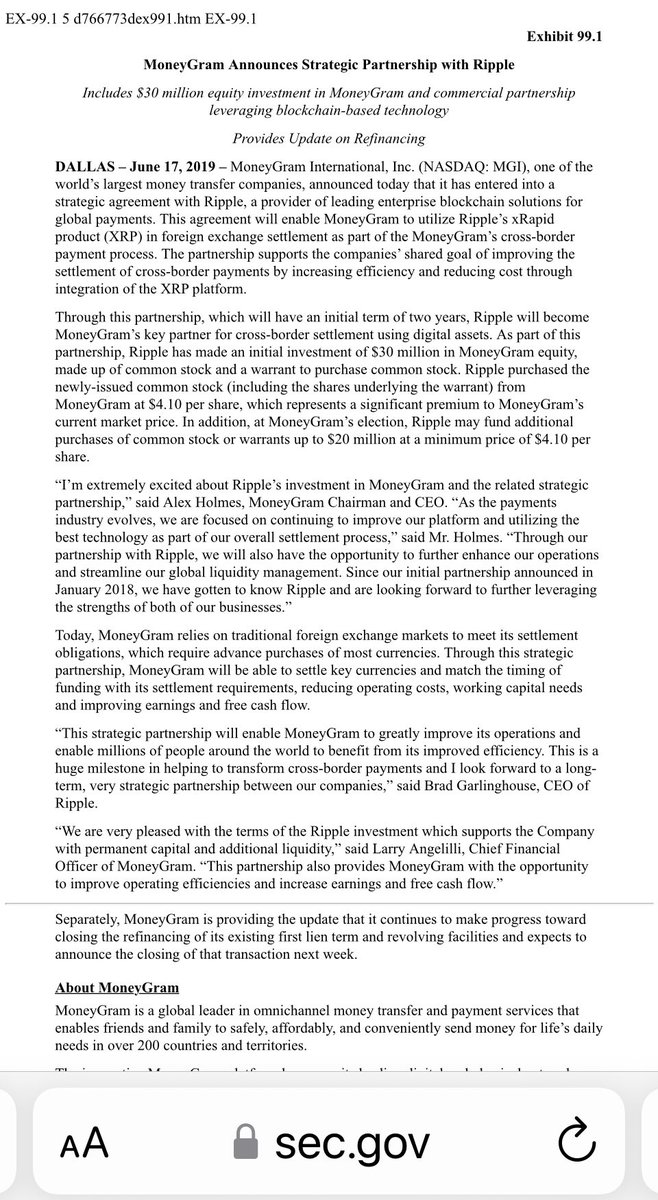Let me repeat what I wrote to Judge Torres:
“The SEC asks this Court to validate its shorthand and analytically lazy contention that Ripple has engaged in the functional equivalent of a nine year-long, on-going, 24/7 ICO, and that each and every sale of XRP, from anywhere in the
“The SEC asks this Court to validate its shorthand and analytically lazy contention that Ripple has engaged in the functional equivalent of a nine year-long, on-going, 24/7 ICO, and that each and every sale of XRP, from anywhere in the
https://twitter.com/kashta9/status/1654257260418457600
world, offered by anyone, including amici, was, is, always has been, and always will be, the offer and sale, of a security. ECF 640 at 49-50 (“a purchase of XRP WAS an investment of money into a common enterprise with other XRP investors and with Defendants.”) (emphasis added);
Id. at 2 (“a purchase of XRP IS an investment in a common enterprise with other XRP holders and with Ripple.”) (emphasis added); also, ECF 153 at 24 (“The XRP traded, EVEN IN THE SECONDARY MARKET...TODAY represents that investment contract.”) (emphasis added).
The SEC’s XRP theory is so farfetched, it travels through space and time, into the future, capturing all possible future sales, even in far-away lands. ECF 46 ¶ 391 (“Even if some country were to recognize XRP as fiat “currency” at SOME POINT IN THE FUTURE, that would result from
Defendants’ significant entrepreneurial and managerial efforts to date (and likely in the future), on which public investors expecting profit relied when making an investment of money into Defendants’ common enterprise.”) (emphasis added).
The scope of the SEC’s Howey argument has become so stretched that it is truly indefinable, in space, or in time. As discussed, infra at 23-24, the SEC asks this Court to assume private statements made by Ripple employees many years ago, to a handful of individuals,
equals evidence that Ripple offered XRP to the world. The SEC is not allowed to shortcut the Howey analysis by alleging each and every sale of XRP from the beginning of time until the end of the world, meets all three Howey prongs, and therefore, doesn’t have to offer
specific transactional evidence. The Howey test must be applied to each transaction and “examined as of the time that the transaction took place.” S.E.C. v. Aqua–Sonic Prods. Corp., 524 F. Supp. 866, 876 (S.D.N.Y. 1981).
Instead, the SEC argues: “[t]he XRP traded, even in the secondary market, is the embodiment of those facts, circumstances, promises, and expectations, and today represents that investment contract.” ECF 153 at 24.
Notably missing at the end of that sentence is a single cite to any precedent or authority supporting such an inimitable claim. Id. Amici, and likely the SEC itself, have no idea what that sentence means under the law.
The SEC’s theory is the equivalent of arguing individual oranges were not only oranges, but also represented the investment contract with the W.J. Howey Company. The SEC’s theory would be a bit amusing, if innocent holders weren’t being severely harmed.”
-John Deaton #XRPHolders
-John Deaton #XRPHolders
@Marc_Fagel @JohnReedStark and others who are smart and capable former SEC enforcement lawyers can credibly argue that at some point Ripple violated Section 5 of the Securities Act. They can credibly argue that most crypto is a scam and that securities laws get violated.
But they cannot credibly argue the SEC’s theory in the Ripple case, shown by citing the actual briefs by the SEC, is supported by the law or protects investors. I’ve said the SEC snatched defeat from the jaws of victory b/c of this absurd over broad theory.
Again, there isn’t a case in the 76 years since Howey that has found the underlying asset in an investment contract is a always a security - not condos, not 🦫s, not 🥃, not chinchillas, not #BTC - and certainly not software code.
In the 76 years since Howey there isn’t a single case where an investment contract was found and there exists NO PRIVITY whatsoever between the buyer and the promoter.
It’s a ridiculous argument made by the SEC and the lawyers at the SEC should be ashamed of themselves.
It’s a ridiculous argument made by the SEC and the lawyers at the SEC should be ashamed of themselves.
The judge called them hypocrites and said they lack a faithful allegiance to the law. Judge Netburn said it not me. I wouldn’t be as polite about how I say it.
• • •
Missing some Tweet in this thread? You can try to
force a refresh

 Read on Twitter
Read on Twitter




